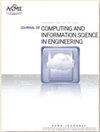Framing Supradisciplinary Research for Intellectualized Cyber-Physical Systems: An Unfinished Story
IF 3.3
3区 工程技术
Q2 COMPUTER SCIENCE, INTERDISCIPLINARY APPLICATIONS
Journal of Computing and Information Science in Engineering
Pub Date : 2023-04-17
DOI:10.1115/1.4062327
引用次数: 1
Abstract
Conceptualization and design of intellectualized, socialized, and personalized cyber-physical systems (CPSs) needs exploration and synthesis of novel knowledge. In turn, it raises the need for a combined use of interdisciplinary, multidisciplinary, and transdisciplinary research. Supradisciplinary research emerged as a new doctrine of combining these research approaches from epistemological, methodological, and procedural perspective. However, no methodology can be found in the literature that could facilitate the practical execution of supradisciplinary research programs and projects. This position paper proposes a conceptual framework that can be used as a blueprint of operationalization of such undertakings. The framework rests on six generic pillars: (i) problematics, (ii) infrastructure, (iii) methodics, (iv) stakeholders, (v) operations, and (vi) knowledge.The framework arranges the concerns in a procedural logic - as they should be considered by the research managers and cyber-physical system developers. In its current form, the framework does not cover the specific societal and personal issues of a successful organization of the inquiry at individual researchers, research teams, and research community levels. Notwithstanding, the framework can facilitate management of research organization tasks, joint formation of shared research infrastructure, setting up concrete research programs, projects, and processes, academic partnering and public stakeholder involvement, process flow management and capacity/competence allocation, and knowledge synthesis, assessment, and consolidation in a holistic manner. Follow up community-based research may focus on the practical application and testing of the framework in concrete cases – a task that an individual researcher cannot address.构建智能化信息物理系统的超学科研究:一个未完成的故事
智能化、社会化、个性化的信息物理系统(cps)的概念化和设计需要对新知识的探索和综合。反过来,它提出了综合运用跨学科、多学科和跨学科研究的需要。超学科研究作为一种从认识论、方法论和程序角度结合这些研究方法的新学说而出现。然而,在文献中没有找到可以促进实际执行超学科研究计划和项目的方法。本立场文件提出了一个概念性框架,可用作这类行动的运作蓝图。该框架基于六个一般支柱:(i)问题,(ii)基础设施,(iii)方法,(iv)利益相关者,(v)运营和(vi)知识。该框架在程序逻辑中安排关注点,因为它们应该由研究经理和网络物理系统开发人员考虑。在目前的形式下,该框架并没有涵盖在单个研究人员、研究团队和研究社区层面成功组织调查的具体社会和个人问题。尽管如此,该框架可以促进研究组织任务的管理,共同形成共享的研究基础设施,建立具体的研究计划、项目和过程,学术合作和公众利益相关者的参与,过程流管理和能力/能力分配,以及知识的综合、评估和整合。以社区为基础的后续研究可能侧重于在具体案例中对框架的实际应用和测试——这是单个研究人员无法解决的任务。
本文章由计算机程序翻译,如有差异,请以英文原文为准。
求助全文
约1分钟内获得全文
求助全文
来源期刊
CiteScore
6.30
自引率
12.90%
发文量
100
审稿时长
6 months
期刊介绍:
The ASME Journal of Computing and Information Science in Engineering (JCISE) publishes articles related to Algorithms, Computational Methods, Computing Infrastructure, Computer-Interpretable Representations, Human-Computer Interfaces, Information Science, and/or System Architectures that aim to improve some aspect of product and system lifecycle (e.g., design, manufacturing, operation, maintenance, disposal, recycling etc.). Applications considered in JCISE manuscripts should be relevant to the mechanical engineering discipline. Papers can be focused on fundamental research leading to new methods, or adaptation of existing methods for new applications.
Scope: Advanced Computing Infrastructure; Artificial Intelligence; Big Data and Analytics; Collaborative Design; Computer Aided Design; Computer Aided Engineering; Computer Aided Manufacturing; Computational Foundations for Additive Manufacturing; Computational Foundations for Engineering Optimization; Computational Geometry; Computational Metrology; Computational Synthesis; Conceptual Design; Cybermanufacturing; Cyber Physical Security for Factories; Cyber Physical System Design and Operation; Data-Driven Engineering Applications; Engineering Informatics; Geometric Reasoning; GPU Computing for Design and Manufacturing; Human Computer Interfaces/Interactions; Industrial Internet of Things; Knowledge Engineering; Information Management; Inverse Methods for Engineering Applications; Machine Learning for Engineering Applications; Manufacturing Planning; Manufacturing Automation; Model-based Systems Engineering; Multiphysics Modeling and Simulation; Multiscale Modeling and Simulation; Multidisciplinary Optimization; Physics-Based Simulations; Process Modeling for Engineering Applications; Qualification, Verification and Validation of Computational Models; Symbolic Computing for Engineering Applications; Tolerance Modeling; Topology and Shape Optimization; Virtual and Augmented Reality Environments; Virtual Prototyping

 求助内容:
求助内容: 应助结果提醒方式:
应助结果提醒方式:


